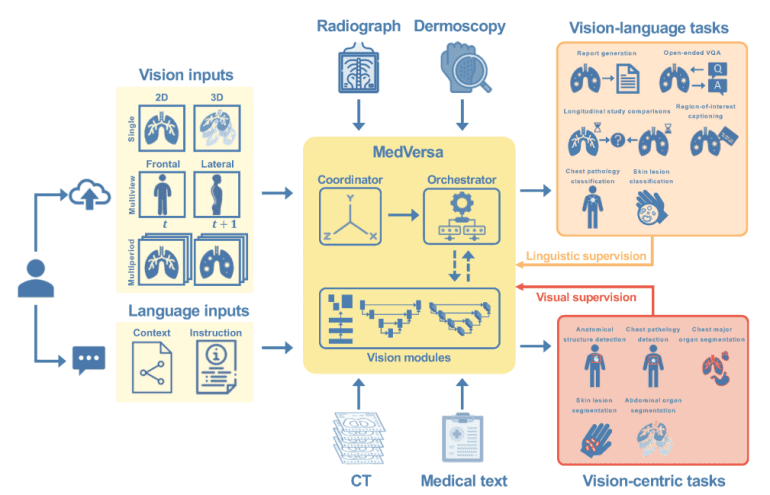- MedVersa represents a groundbreaking approach to medical AI, addressing the limitations of task-specific models.
- Developed by collaboration between top-tier institutions, it integrates visual and linguistic cues for versatile medical image interpretation.
- Its architecture comprises a multimodal input coordinator, a large language model-based orchestrator, and learnable vision modules.
- MedVersa excels in generating radiology reports, precise anatomical structure detection, and medical image segmentation.
- Training involves a diverse multimodal dataset, MedInterp, and advanced techniques like Low-Rank Adaptation (LoRA).
- Outperforms existing models across various tasks, demonstrating superior adaptability and robustness.
- Market implications include potential for reshaping healthcare delivery through enhanced image interpretation capabilities.
Main AI News:
In today’s dynamic healthcare landscape, the integration of artificial intelligence (AI) holds immense promise for revolutionizing medical image interpretation. However, traditional AI systems often fall short due to their task-specific nature, presenting a significant barrier to their widespread adoption. Addressing this challenge head-on, a groundbreaking solution has emerged from the collaborative efforts of researchers at esteemed institutions like Harvard Medical School, USA; Jawaharlal Institute of Postgraduate Medical Education and Research, India; and Scripps Research Translational Institute, USA. This solution, known as MedVersa, represents a paradigm shift in medical AI by introducing a generalist learner designed to flexibly tackle the diverse and complex needs of clinical practice.
MedVersa’s innovative approach transcends the limitations of existing task-specific models by embracing a multifaceted learning framework. Unlike its predecessors, which are confined to narrow domains like chest pathology identification or skin disease classification, MedVersa harnesses the power of a large language model as its learnable orchestrator. This unique architecture enables MedVersa to seamlessly integrate both visual and linguistic cues, thereby facilitating real-time task adaptation and ensuring versatility across a wide spectrum of medical scenarios.
At the core of MedVersa lies a meticulously crafted methodology comprising three fundamental components: the multimodal input coordinator, the large language model-based learnable orchestrator, and a suite of learnable vision modules. Through the synergistic interplay of these components, MedVersa excels in both vision-language tasks—such as generating comprehensive radiology reports—and vision-centric challenges, including precise anatomical structure detection and accurate medical image segmentation.
Fueling the success of MedVersa is its robust training regimen, underpinned by a diverse array of publicly available medical datasets meticulously curated into a unified multimodal dataset named MedInterp. Leveraging advanced techniques such as multimodal input coordination and Low-Rank Adaptation (LoRA) strategy, MedVersa pushes the boundaries of performance while ensuring efficiency and scalability.
The transformative impact of MedVersa is unmistakable, as evidenced by its superior performance across a multitude of critical tasks. From radiology report generation to chest pathology classification, MedVersa consistently outperforms existing state-of-the-art models, underscoring its unparalleled adaptability and robustness. Notably, MedVersa achieves an average F1 score of 0.615 in chest pathology classification, surpassing conventional models by a significant margin. Moreover, its prowess in anatomical structure detection rivals that of established benchmarks like YOLOv5, particularly in detecting lung zones, where it achieves remarkable precision.
Conclusion:
MedVersa’s emergence signifies a pivotal moment in the medical AI market, heralding a shift towards more flexible and effective image interpretation solutions. Its ability to outperform existing models across diverse tasks highlights its potential to reshape healthcare delivery by enhancing diagnostic accuracy and efficiency. As demand for advanced image analysis tools continues to grow, MedVersa’s innovative approach positions it as a frontrunner in driving transformative change within the industry.

